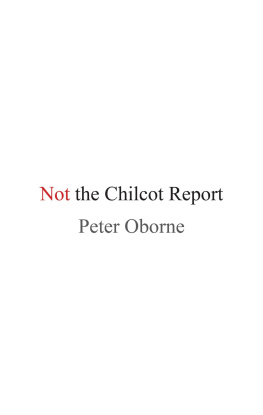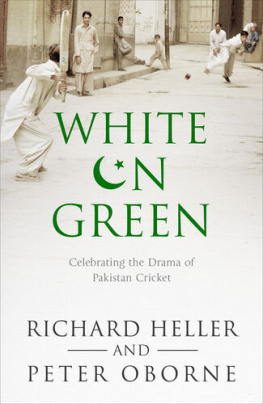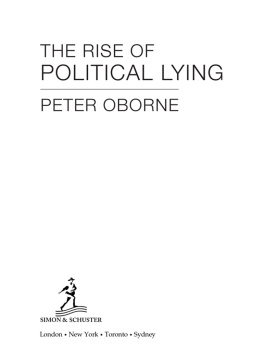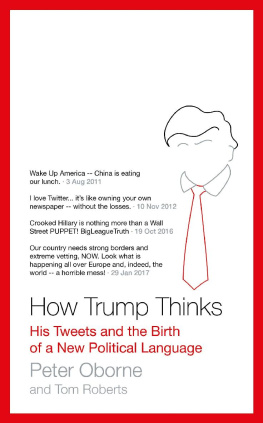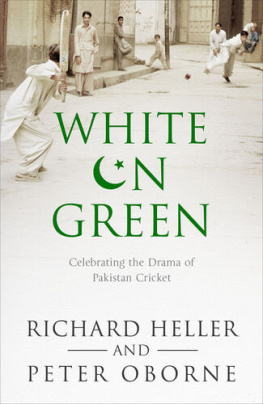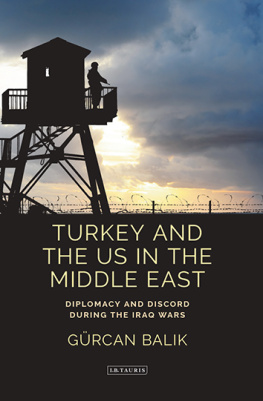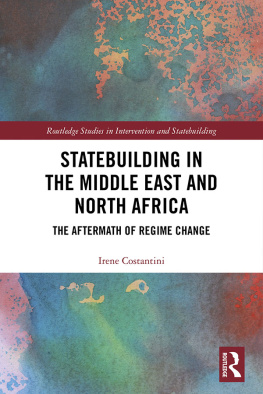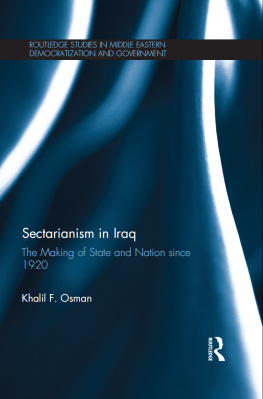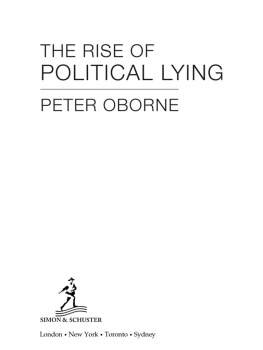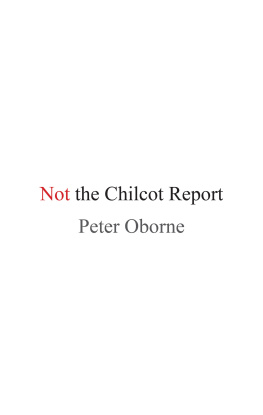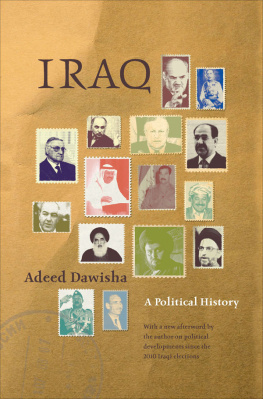NOT THE CHILCOT REPORT
Peter Oborne
www.headofzeus.com

The defining calamity of the post-cold war era, in Peter Obornes words, took place in 2003. The invasion of Iraq led to the collapse of the state system in the Middle East. Iraq is shattered, Syria may never be put back together again, and Lebanon is once again threatened with collapse. The great wave of refugees unleashed by this breakdown is threatening what is left of democracy in Turkey and the very existence of the European Union.
Oborne provides a forensic examination of the way evidence was doctored and the law manipulated in order to justify a war for regime change. The government bent facts to fit its determination to join the US invasion, Parliament failed to scrutinise evidence, the intelligence service was perverted, and the media lost its head.
This is a masterly account of the making of a disaster, written by a passionate British democrat.
Contents
I started to ponder this book when repeated delays and obstructions meant that it had become doubtful whether Sir John Chilcots report would ever appear in a worthwhile form.
I reflected that almost all the relevant testimony could already be found on the excellent Iraq Inquiry website. I concluded that it was possible for an interested observer to study the evidence presented to Sir John Chilcot, follow leads of his own, then reach his or her own conclusions.
I have asked four key questions: Did Tony Blair lie to the British people ahead of the war? Was the war lawful? Did Tony Blair and George W. Bush reach a secret agreement when they met at Crawford in 2002? Has the Iraq War left Britain a safer place, as was promised? I have also tried to narrate the background to the invasion of Iraq, and to spell out some of the consequences, and the lessons that should be learned.
Above all I hope this book will assist lay readers who want to make sense of the Chilcot Report. It is anticipated that Sir Johns report will stretch to around 2 million words (nearly four times the length of War and Peace ), while dozens of those involved will be criticized, suggesting an unfocused, scattergun approach. Making sense of this mass of detail will be very hard. I have tried to focus on the most important issues, and assemble the essential evidence.
The most complex and controversial dilemma I faced concerned the moral character of Tony Blair. Did he lie to Parliament and the British people to make the case for war? Some good judges, including the chief weapons inspector Hans Blix, a former diplomat, have told me that they judged he did.
A lie contains two separate elements. It may well embrace a falsehood, but above all it must be uttered in the knowledge that it is false. A lie does not mean only pure invention. It also embraces presenting assertion and speculation as certain, corroborated fact. It must be intended to deceive.
Tony Blair has consistently asserted that he did not lie in the run-up to the invasion of Iraq. He agrees that he might have made mistakes, and even accepted that some of his statements about Saddams weapons of mass destruction were wrong. However, he has been adamant that, whatever the faults of others, he himself acted in good faith.
Here is one recent example of this self-justification. Last October, during an interview with CNN, Mr Blair told Fareed Zakaria: I apologize for the fact that the intelligence we received was wrong. Here Mr Blair is placing the blame on the British intelligence services for producing erroneous information, which he as prime minister innocently passed on to the British public.
I investigated this account. It does not stand up to scrutiny. I demolish the idea that Tony Blair simply reiterated what he was told by the intelligence services. In fact he exaggerated and misrepresented the intelligence he was receiving from the Joint Intelligence Committee.
Lord Butler, who in 2004 carried out the review into the use of intelligence in the lead-up to the Iraq invasion, has since been damning about this:
neither the United Kingdom nor the United States had the intelligence that proved conclusively that Iraq had those weapons [weapons of mass destruction]. The Prime Minister was disingenuous about that. The United Kingdom intelligence community told him on 23 August 2002 that, we... know little about Iraqs chemical and biological weapons work since late 1988. The Prime Minister did not tell us that. Indeed, he told Parliament only just over a month later that the picture painted by our intelligence services was extensive, detailed and authoritative. Those words could simply not have been justified by the material that the intelligence community provided to him.
So Tony Blair made false statements about Saddam Husseins so-called weapons of mass destruction even though he had access to intelligence reports that proved that what he was saying was wrong. There can moreover be no doubt that Mr Blair read the underlying intelligence, because Mr Blair himself revealed as much in his evidence to the Chilcot Inquiry.
Does this make Tony Blair a liar? It is still just about arguable that it does not. Remember: a lie must be uttered with intent to deceive. Otherwise it is not a lie. Mr Blair and his supporters can continue to say that he believed what he was saying about Saddams weapons of mass destruction to be true. Ultimately nobody can challenge this unless Mr Blair were on record as admitting that he knew at the time he uttered it that what he was saying was false. He has made no such statement.
So is Mr Blair in the clear? Not at all. Back in 2003 Mr Blair was British prime minister. His remarks concerning British intelligence were used to justify a war in which countless people were to die, including 179 British servicemen. It is surely axiomatic that, if a British prime minister cites the intelligence services, the British public and Parliament are entitled to assume that he is telling the truth.
Furthermore, there is a discernible pattern to the way Mr Blair and his circle dealt with the British people ahead of the war. They highlighted information that placed the threat posed by the Iraqi dictator in the worst possible light. They kept quiet meanwhile about relevant facts that damaged their cause. They misrepresented the actions and motives of those opposed to war. Some of Mr Blairs wildest statements about WMD were made to Parliament. This meant that he repeatedly flouted his own ministerial code of conduct, which insisted that it is of paramount importance that Ministers give accurate and truthful information to Parliament, correcting any inadvertent error at the earliest opportunity.
There was never any attempt to correct false statements after they had been uttered. In fact Tony Blairs claim that the intelligence picture was extensive, detailed and authoritative, dismantled by Lord Butler above, remains on the parliamentary record some thirteen years after it was made.
All that said, the fact remains that no outside observer can say what was going on inside the mind of Tony Blair as war loomed in 2003. The former prime ministers claim that he acted in good faith may therefore be ultimately impossible to refute.
Accepting that Mr Blair acted in good faith, however, brings with it a fresh series of problems. Mr Blair admits that he read the intelligence provided for him by the JIC. Why did he repeatedly pass on to the British people such a misleading account of the intelligence he was receiving? Why did he give a selective and therefore false account of the report by the United Nations weapons inspectors in his speech to Parliament on 18 March 2003? Why did he give such a selective account of the French President Jacques Chiracs position on a second resolution in that 18 March speech? Similar questions abound.

